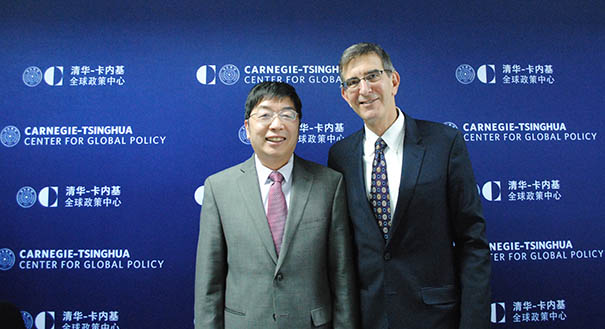Registration
You will receive an email confirming your registration.
As U.S. President-elect Donald Trump begins to assemble his administration, the future of the U.S. government’s Asia policy is deeply uncertain. While North Korea continues to carry out more sophisticated nuclear tests and tensions escalate in the South China Sea, U.S.-China cooperation is more important than ever for regional stability in the Asia-Pacific. However, a growing number of cyber disputes is challenging the relationship between the two major powers. How will these foreign policy issues in Asia be perceived and addressed by the Trump administration?
To understand the new U.S. administration's approaches to Asia-Pacific regional stability and security, Carnegie–Tsinghua’s Li Bin moderated a discussion with George Perkovich, vice president for studies at the Carnegie Endowment for International Peace. Perkovich also shared his expertise on cross-border terrorism and discussed his recent co-authored book on violent and non-violent measures to prevent cross-border terrorism in South Asia, Not War, Not Peace: Motivating Pakistan to Prevent Cross-Border Terrorism.
This event was off the record.
Discussion Highlights
- The Power of Personality: Panelists said that while a U.S. president’s personality has always played a role in shaping foreign policy, temperament may play an even larger role than usual in the Trump administration. President-elect Trump, they said, may heavily rely on his personal instincts and reactions, rather than on an overarching strategy to shape U.S. relations with the world. Bilateral relations may also be established on a personal basis, mirroring relations at the interpersonal level as opposed to an international one. This personality-centered approach could lead to inconsistency in America’s foreign policy, one panelist argued.
- A Stronger Cabinet: President-elect Trump’s senior advisors, particularly secretary of state, secretary of defense, and national security advisor, are expected to play an outsized role in the incoming administration, panelists said. Because he lacks prior experience in public administration or foreign policy, a discussant argued that Trump will depend on his cabinet and advisors to fill in the gaps of his professional expertise. Trump’s cabinet picks, pending their confirmations, have the potential to define the future of U.S. policy. Nonetheless, one panelist predicted that successive dismissals, much like those experienced during the early Reagan era, will feature prominently in the administration.
- Unconventional Communication Methods: One discussant pointed out that, in a break with the president’s traditional reliance on the press, Trump has instead turned to television and Twitter to interact with the public. Consequently, the panelist expects Trump to be an unorthodox president who runs at the same speed and wavelength as the news cycle. Policymakers should expect to see him address issues featured on the evening news, rather than those just coming over the horizon, a discussant said, and ideology and strategy will not be a significant priority of the incoming administration.
- An Opportunity for China: Trump’s isolationist tendencies may lead to U.S. disengagement in certain areas of international affairs, one panelist suggested. Where the United States withdraws, some panelists said, China may see an opportunity to advance and grow its own international influence, which could include filling a void left by receding U.S. leadership. China has already shown a willingness to lead in areas such as climate change, with the Paris Climate Change Agreement, and in development, with its Belt and Road Initiative. However, a panelist argued that it is unclear if China would accept such a leadership role.
- Uncertainty Prevails: Each panelist touched on the uncertainty surrounding the incoming administration, its players, and its strategy. While Trump may rely on his senior officials to bolster his foreign policy, the president-elect’s presence in the media spotlight could mean that senior officials will be more closely watched, the panelists said. Trump’s experience with business dealings and contracts could lead him to the negotiating table with North Korea, a panelist argued, but his aversion to generating bad press could cause him to take a hard line against Kim Jong-un’s nuclear tests.
Li Bin
Li Bin is a senior associate working jointly in the Nuclear Policy Program and Asia Program at the Carnegie–Tsinghua Center for Global Policy and a professor of Tsinghua University.
George Perkovich
George Perkovich is vice president for studies at the Carnegie Endowment for International Peace. He works primarily on nuclear strategy and nonproliferation issues, and on South Asian security.
